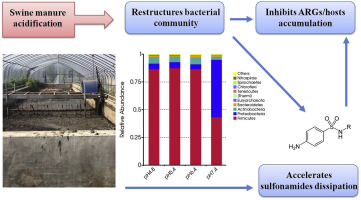当前位置:
X-MOL 学术
›
Environ. Pollut.
›
论文详情
Our official English website, www.x-mol.net, welcomes your
feedback! (Note: you will need to create a separate account there.)
Acidic conditions enhance the removal of sulfonamide antibiotics and antibiotic resistance determinants in swine manure.
Environmental Pollution ( IF 7.6 ) Pub Date : 2020-03-26 , DOI: 10.1016/j.envpol.2020.114439 Hui Lin 1 , Wanchun Sun 1 , Qiaogang Yu 1 , Junwei Ma 1
Environmental Pollution ( IF 7.6 ) Pub Date : 2020-03-26 , DOI: 10.1016/j.envpol.2020.114439 Hui Lin 1 , Wanchun Sun 1 , Qiaogang Yu 1 , Junwei Ma 1
Affiliation

|
Manure pH may vary depending on its inherent composition or additive contents. However, the effect of pH on the fate of antibiotics and antibiotic resistance determinants in manure remains unclear. This work demonstrated that pH adjustment promoted the removal of different sulfonamide antibiotics (SAs) within swine manure under incubation conditions, which increased from 26-60.8% to 75.0-86.0% by adjusting the initial pH from neutral (7.4) to acidic (5.4-4.8). Acidification was also demonstrated to inhibit the accumulation of antibiotic resistance genes in manure during incubation. Acidified manure contained both lower absolute and relative abundances of sul1 and sul2 than those at a neutral pH like 7.4. Further investigation indicated that acidification promoted the reduction of sul genes in manure by restricting sulfonamide-resistant bacteria (SRB) proliferation and inhibiting IntI1 accumulation. Furthermore, pH adjustment significantly influenced the composition of the manure bacterial community after incubation, which increased Firmicutes and decreased Proteobacteria. Close relationships were observed between pH-induced enrichment of the Firmicutes bacterial phylum, enhanced SAs degradation, and the fates of antibiotic resistance determinants. Overall, lowering the pH of manure promotes the degradation of SAs, decreases sul genes and SRB, and inhibits horizontal sul gene transfer, which could be a simple yet highly-effective manure management option to reduce antibiotic resistance.
中文翻译:

酸性条件增强了猪粪中磺酰胺类抗生素和抗生素耐药性决定因素的去除。
肥料的pH值可能取决于其固有组成或添加剂含量。但是,pH值对粪肥中抗生素和抗生素抗性决定因素命运的影响尚不清楚。这项工作表明,在孵化条件下,pH值的调节促进了猪粪中不同磺酰胺类抗生素(SAs)的去除,通过将初始pH值从中性(7.4)调整为酸性(5.4-pH),其从26-60.8%增加到75.0-86.0%。 4.8)。还证明了酸化可抑制培养过程中粪便中抗生素抗性基因的积累。酸化后的粪肥中,sul1和sul2的绝对和相对丰度均低于中性pH(如7.4)。进一步的研究表明,酸化通过限制耐磺酰胺细菌(SRB)增殖和抑制IntI1积累,促进了粪便中sul基因的减少。此外,pH值的调节在孵育后会显着影响粪便细菌群落的组成,从而增加菌毛并减少变形杆菌。pH引起的Firmicutes细菌门的富集,SAs降解增强和抗生素抗性决定因素的命运之间存在密切关系。总体而言,降低粪便的pH值可促进SAs的降解,减少sul基因和SRB,并抑制水平sul基因的转移,这可能是降低抗生素耐药性的简单而高效的粪便管理方法。此外,pH值的调节在孵育后会显着影响粪便细菌群落的组成,从而增加菌毛并减少变形杆菌。pH诱导的Firmicutes细菌门的富集,SAs降解增强和抗生素抗性决定因素的命运之间存在密切的关系。总体而言,降低粪便的pH值会促进SAs的降解,降低sul基因和SRB,并抑制水平sul基因的转移,这可能是减少抗生素耐药性的简单而高效的粪便管理方法。此外,pH值的调节在孵育后会显着影响粪便细菌群落的组成,从而增加菌毛并减少变形杆菌。pH诱导的Firmicutes细菌门的富集,SAs降解增强和抗生素抗性决定因素的命运之间存在密切的关系。总体而言,降低粪便的pH值可促进SAs的降解,减少sul基因和SRB,并抑制水平sul基因的转移,这可能是降低抗生素耐药性的简单而高效的粪便管理方法。pH诱导的Firmicutes细菌门的富集,SAs降解增强和抗生素抗性决定因素的命运之间存在密切的关系。总体而言,降低粪便的pH值可促进SAs的降解,减少sul基因和SRB,并抑制水平sul基因的转移,这可能是降低抗生素耐药性的简单而高效的粪便管理方法。pH诱导的Firmicutes细菌门的富集,SAs降解增强和抗生素抗性决定因素的命运之间存在密切关系。总体而言,降低粪便的pH值可促进SAs的降解,减少sul基因和SRB,并抑制水平sul基因的转移,这可能是降低抗生素耐药性的简单而高效的粪便管理方法。
更新日期:2020-03-27
中文翻译:

酸性条件增强了猪粪中磺酰胺类抗生素和抗生素耐药性决定因素的去除。
肥料的pH值可能取决于其固有组成或添加剂含量。但是,pH值对粪肥中抗生素和抗生素抗性决定因素命运的影响尚不清楚。这项工作表明,在孵化条件下,pH值的调节促进了猪粪中不同磺酰胺类抗生素(SAs)的去除,通过将初始pH值从中性(7.4)调整为酸性(5.4-pH),其从26-60.8%增加到75.0-86.0%。 4.8)。还证明了酸化可抑制培养过程中粪便中抗生素抗性基因的积累。酸化后的粪肥中,sul1和sul2的绝对和相对丰度均低于中性pH(如7.4)。进一步的研究表明,酸化通过限制耐磺酰胺细菌(SRB)增殖和抑制IntI1积累,促进了粪便中sul基因的减少。此外,pH值的调节在孵育后会显着影响粪便细菌群落的组成,从而增加菌毛并减少变形杆菌。pH引起的Firmicutes细菌门的富集,SAs降解增强和抗生素抗性决定因素的命运之间存在密切关系。总体而言,降低粪便的pH值可促进SAs的降解,减少sul基因和SRB,并抑制水平sul基因的转移,这可能是降低抗生素耐药性的简单而高效的粪便管理方法。此外,pH值的调节在孵育后会显着影响粪便细菌群落的组成,从而增加菌毛并减少变形杆菌。pH诱导的Firmicutes细菌门的富集,SAs降解增强和抗生素抗性决定因素的命运之间存在密切的关系。总体而言,降低粪便的pH值会促进SAs的降解,降低sul基因和SRB,并抑制水平sul基因的转移,这可能是减少抗生素耐药性的简单而高效的粪便管理方法。此外,pH值的调节在孵育后会显着影响粪便细菌群落的组成,从而增加菌毛并减少变形杆菌。pH诱导的Firmicutes细菌门的富集,SAs降解增强和抗生素抗性决定因素的命运之间存在密切的关系。总体而言,降低粪便的pH值可促进SAs的降解,减少sul基因和SRB,并抑制水平sul基因的转移,这可能是降低抗生素耐药性的简单而高效的粪便管理方法。pH诱导的Firmicutes细菌门的富集,SAs降解增强和抗生素抗性决定因素的命运之间存在密切的关系。总体而言,降低粪便的pH值可促进SAs的降解,减少sul基因和SRB,并抑制水平sul基因的转移,这可能是降低抗生素耐药性的简单而高效的粪便管理方法。pH诱导的Firmicutes细菌门的富集,SAs降解增强和抗生素抗性决定因素的命运之间存在密切关系。总体而言,降低粪便的pH值可促进SAs的降解,减少sul基因和SRB,并抑制水平sul基因的转移,这可能是降低抗生素耐药性的简单而高效的粪便管理方法。











































 京公网安备 11010802027423号
京公网安备 11010802027423号